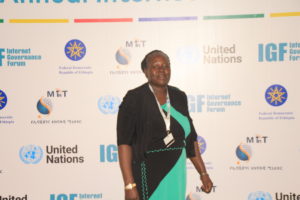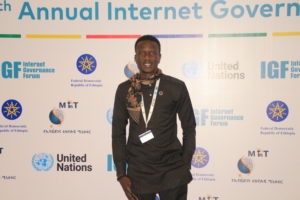Libraries for an inclusive internet – and internet governance!
13 December 2022
IFLA was active at the 2022 Internet Governance Forum, held in Addis Ababa, Ethiopia, speaking both in UNESCO sessions on Internet Universality Indicators, and the Dynamic Coalition on Public Access in Libraries session on inclusive internet governance.
Internet inclusion is arguably a pre-condition of inclusiveness across the range of policy action. For libraries in particular, the importance of being able to access and use digital information is clear, and is something we guarantee through our work.

The 17th Internet Governance Forum focused strongly on ideas in this area, under the broader theme: Resilient Internet for a Shared Sustainable and Common Future. Bringing together governments, intergovernmental organisations, business, civil society organisations and other stakeholders, it offered again an opportunity to highlight the role of libraries and library values in creating a better internet.
IFLA’s representation came from Sarah Kaddu, Chair, IFLA Regional Division Committee for Sub-Saharan Africa, and Damilare Oyedele, Member of the same committee.
Measuring meaningful access
They participated actively in two sessions organised by UNESCO looking at the implementation of its Internet Universality Indicators, and steps for the future.
The Internet Universality Indicators offer a tool for governments and others to assess how inclusive the internet currently is in their countries, and so stimulate debate and desirable change. Focusing on questions of rights, openness, accessibility and multi-stakeholder working, it covers many of the questions around which libraries advocate, from protection of access to information to copyright and public access.
Through their interventions in relevant sessions, Sarah and Damilare highlighted the potential for involving libraries more closely in national consultations around the Indicators as they stand now, and to reconsider how libraries and public access are addressed in any future iterations.
In particular, they stressed the need to think hard about what meaningful internet access looks like, a point echoed by Marielza Oliveira, UNESCO Director for Partnerships and Operational Programme Monitoring, Communications and Information Sector. Through ensuring that people not only enjoy connections, but also have the content, devices, and practical support to use it, libraries are key to making connectivity meaningful.

Ensuring inclusive governance
A particular highlight of the Forum was the Dynamic Coalition on Public Access in Libraries session on the final day, which addressed the topic of inclusive internet governance.
Crucially, once users have built up their understanding of how to use the internet, a next step is for them to become more active, both in taking their own choices about what to share or not, but also to get involved in internet governance discussions.
This is particularly valuable now, given the ambitious legislative agendas being pursued in many countries around digital issues, and which otherwise risk being steered only be a narrower set of interests and perspectives.
The session, chaired by Sarah Kaddu, brought together perspectives from Rwanda and Nigeria (Damilare Oyedele), Lithuania and other EIFL countries (Ramune Petuchovaite), Uganda (Peter Balaba) and Canada (IFLA).
The speakers highlighted the full range of ways in which libraries enabled more active citizenship, from broadening connectivity to developing eGovernment programmes in consultation with users, and specific internet governance training offered to users in Toronto, Canada.
It underlined in particular the role that libraries can play in partnership with others in order to deliver more inclusive governance, drawing on the unique strengths of libraries. Crucially, it looked to build a bridge between internet governance discussions, and wider library work on civic participation.
We will follow up on this work with the Dynamic Coalition on Public Access in Libraries, as well as with IFLA’s own volunteers, to gather further ideas around this theme, in order to share these in the course of 2023.
We are grateful to Sarah and Damilare for attending, and making the case for libraries so effectively!